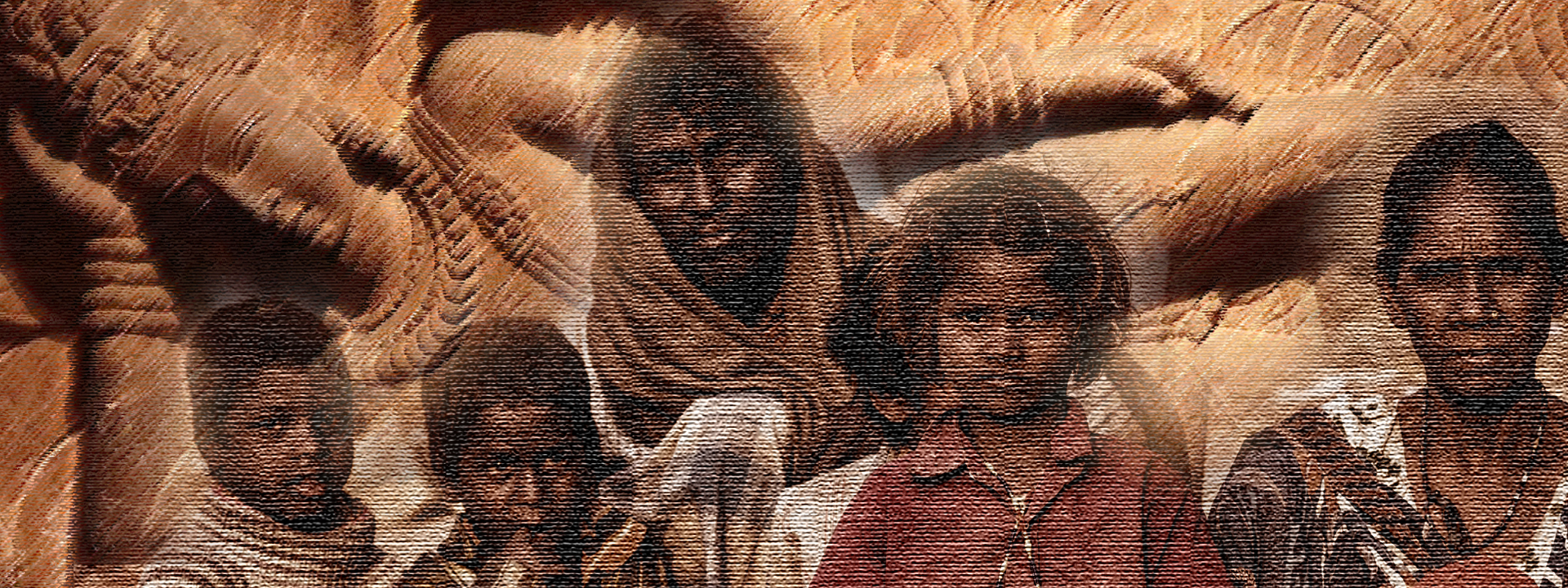When the Indian government declared a nationwide lockdown to help combat the spread of COVID-19, the entire country was thrown into panic. Prime Minister Narendra Modi made the announcement on the evening of March 24, short of four hours before the decree was to take place, not giving people enough time to secure provisions.
For millions upon millions of India’s poor and migrant workers, this tight deadline proved to be not just inconvenient, but also devastating. The sudden lockdown left migrant workers stuck in the capital without work, food, dignified lodging, and means to return home to their families.
In this interview by writer Uday Rana, author and human rights activist Harsh Mander details the difficulties migrant workers went through under India’s lockdown, imposed almost a year ago today, on March 24, 2020. It reveals the ways in which India’s society sees their poor as sub-human.
The transcript below has been edited for conciseness.
Uday Rana:
Imagine the entire population of Malaysia. Now imagine that all of its 30 million residents are suddenly displaced overnight. In March last year, India’s Prime Minister announced a nationwide lockdown to stop the spread of COVID-19.
The economy came to a grinding halt. Migrant workers, who depended on daily wages, had nowhere to go.
Some walked hundreds of kilometers back to their villages, some died of hunger, some were assaulted by the police, others died simply of exhaustion.
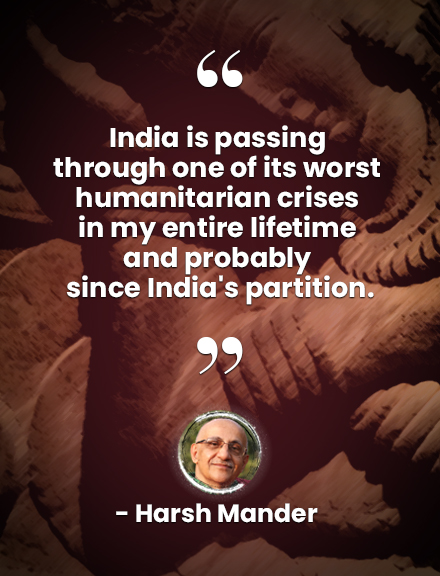 One estimate puts the number of displaced migrants in India to be around about the same as the entire population of Malaysia: 30 million people.
One estimate puts the number of displaced migrants in India to be around about the same as the entire population of Malaysia: 30 million people.
Joining us on this podcast is noted human rights activist and author Harsh Mander. He has just come out with his book on this exodus called “Locking down the poor.” He says this is the worst humanitarian crisis that the country has faced since the partition of India by the British, back in 1947.
Let’s ask him just how big this crisis is. Harsh, thank you so much for being here.
Harsh Mander:
Thank you.
India is passing through one of its worst humanitarian crises in my entire lifetime and probably since India’s partition. The important thing to understand is that this crisis was not created by the virus. It was created by public policy choices that that only deal with the virus.
If you have the majority of the population in cities where 10 people crowd a single room, a hundred people sometimes share a public toilet with no running water, then the very idea of a lockdown [is contentious].
When the prime minister said: please stay at home, work from home, keep social distancing, wash your hands regularly, he was in fact only speaking to the middle class. Even in conception, there was nothing in the design of a lockdown for the large mass of the poor. It was really only providing protection to the middle classes and people with homes. We seem to just forget about the working poor.
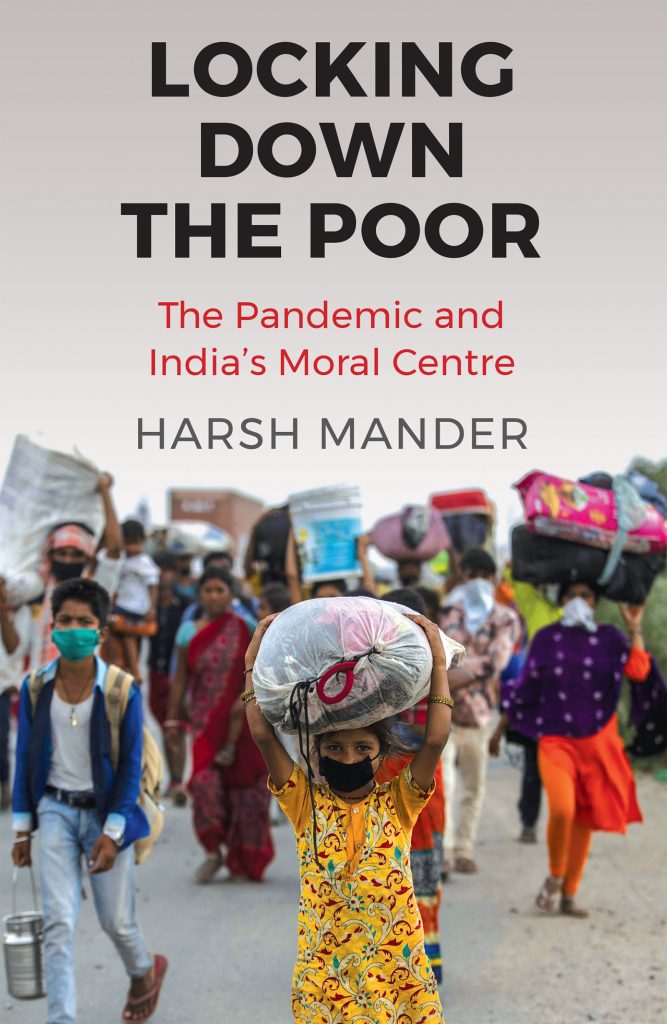
Harsh Mander’s book, “Locking down the poor,” looks at how India’s handling of the pandemic has led to catastrophic consequences, leaving millions of its people hungry and homeless. Photo credit: Harsh Mander, Locking down the poor: The pandemic and India’s moral center (published by Speaking Tiger).
If there was [any] justification whatsoever for the lockdown, it was for preparing public health systems. But India is a country that has chosen to have a highly privatized healthcare system. We spent less than 1 percent of GDP on public health, and 80 percent of trained health personnel work for the profit of private sector.
The prime minister [also] talked about 100,000 new beds. He was being economical with the truth because what they were doing was not creating new beds, but repurposing existing beds. So, you had cancer patients in Mumbai being pulled out and made to sleep on mats under other beds to create COVID-19 beds.
[The lockdown has] been devastating in its human consequences. India has never seen this kind of explosion of hunger and joblessness.
Rana:
You mentioned that you and other volunteers traveled across India meeting migrant workers, and you were certainly helping people in need, but you were also doing something [else, which was] documenting what was happening.
You were recording and seeing the rough notes of history that we are writing right now. When you were out there, on the streets, what did you see?
Mander:
I saw devastating humiliation and desperation of the very poor for no fault of theirs.
We hadn’t really planned to launch a massive relief program around the country but we were almost drawn to it because of the desperation that we saw and the failure of the government to respond.
Very soon our numbers started circulating they became de facto distress call centers, and very quickly we moved to industrial worker sites. They would tell us that never in their lives they thought that they would put their hands out for food.
They were badly exploited, none of them were getting minimum wages. They had regular lives [before] and suddenly all of that broke down.
[Some] people would wake up in the morning and sit in line in the hot sun maybe 3 hours, 4 hours to get a rice bowl and they just eat it, and then again, they have to sit in line for another 3 hours for the next meal. [Meanwhile,] the middle class is getting their salaries sitting at home.
You have to provide the standard minimum wage to every person and provide the equivalent of a universal ration system. You cannot treat millions of people this way, [leave them] hopeless and with total lack of compassion.
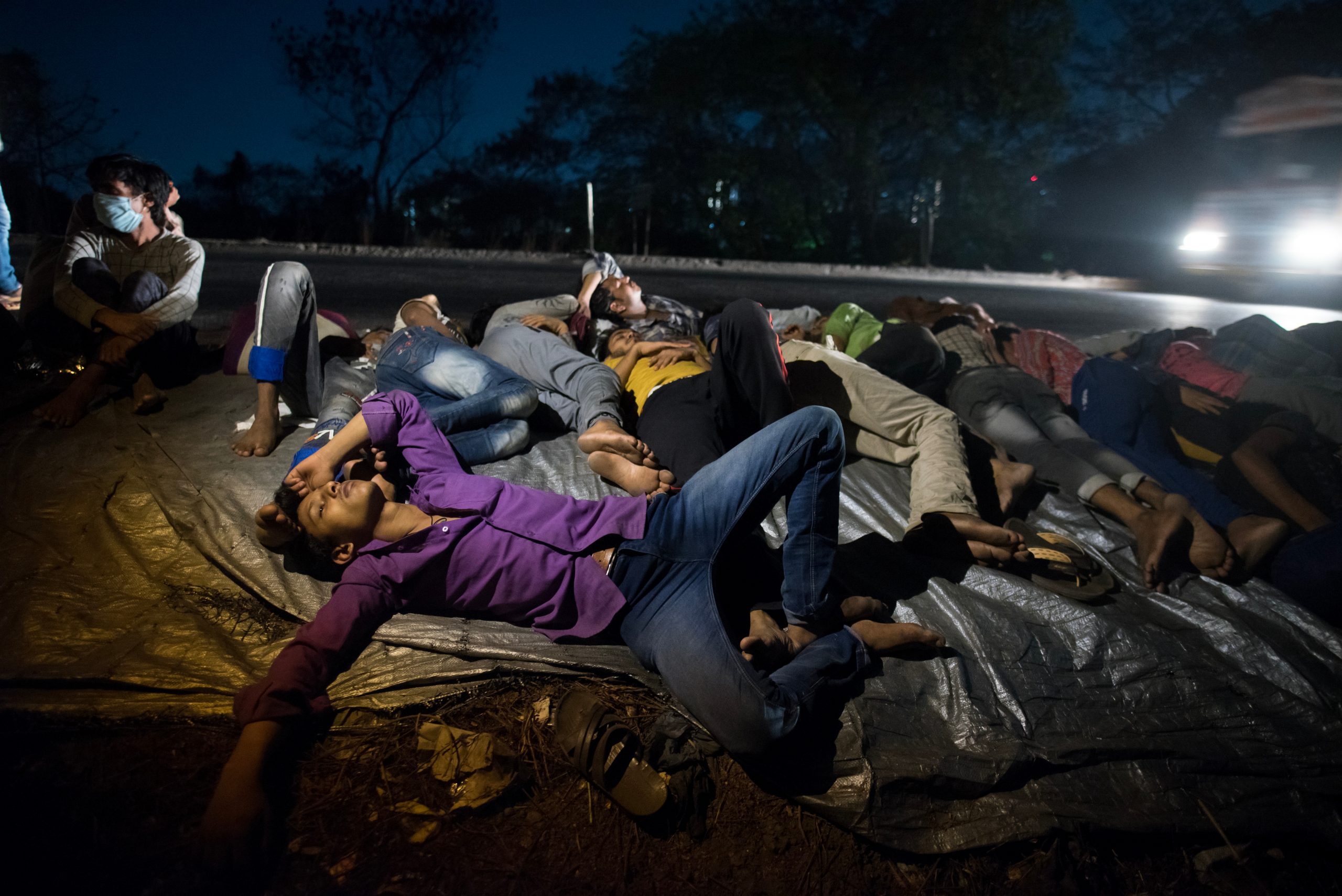
May 2020. Migrant workers sleep along the highway as they make their way back home to their villages. Following the nationwide lockdown due to the pandemic, many migrant workers lost their livelihoods. Trapped in a vortex of poverty, hunger, and destitution, they were forced to rely on charity just to survive.
Rana:
I also want to talk about the media coverage of this crisis. Now, the corporate media in India is seen as very government-friendly.
The coverage almost looks like they were covering an act of God. It was painting [the situation] in the same way you would report a tsunami or a flood. But you were very clear in your book, and you’re right when you said that it was not an act of God, that it was not something that happened because of the virus.
It was simply a policy failure. So, my question to you is this: To what extent is the prime minister of India personally responsible for this humanitarian crisis?
Mander:
I think the prime minister is personally, centrally responsible for this.
Part of it is the way he makes decisions. He has converted the system into a de facto presidential form of government. [We have] evidence that he did not consult parliament. He did not consult his ministers. He did not consult his cabinet, and now we have documents to show that even [the advice of] government epidemiologists [was not heeded.]
The media is mostly celebratory of the government, whatever it does. The distress of the migrants was so dramatic that [we] needed help reporting about the situation. After a while I just couldn’t bear the fact that people were not getting these stories.
A lot of young people started coming out with me [and there was] this one boy with a camera who decided that he would accompany me wherever. After we distributed food, I would often turn [into a] reporter. I would start recording the cities and report on the ground describing what people were going through.
I remember this woman who, as I was walking past their shanty, was cooking on two bricks on a stove. Suddenly, she covered it up with her sari, so I stopped and I asked what her problem was. She said she was so ashamed.
After I asked why, she lifted her sari and revealed that she was cooking the feet of chicken, something which is usually thrown away. She said that she’s come to such a point where this is all that she could manage to get and feed my children.
I sat with her and told her to please not be ashamed, it is the government that should be ashamed.
We have no business to reduce our populations to this kind of humiliating destitution, hunger, and hopelessness.
Rana:
That actually is the segue to my last question for you. There will be a set-up. In your book, you acknowledge the work of many journalists. I think a line you quote from a piece by journalist Ipsita Chakravarthy really distills your central idea. She said, “The government chose to protect the chosen.”
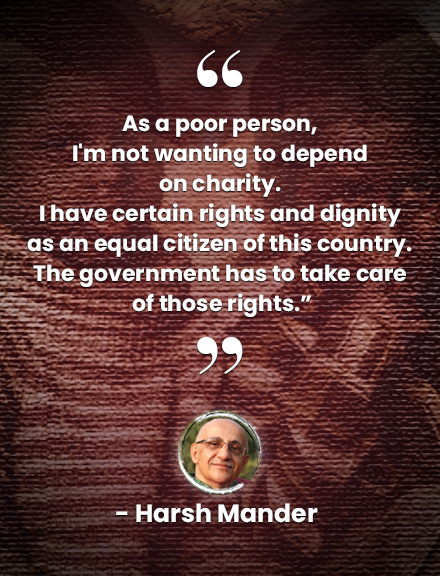 I also want to quote a migrant worker who was featured in your book. His name is Sudhir Kumar Rajak and he said “why not step out and die of Corona, at least we will be counted somewhere?”
I also want to quote a migrant worker who was featured in your book. His name is Sudhir Kumar Rajak and he said “why not step out and die of Corona, at least we will be counted somewhere?”
Now, I want you to reflect on these two lines and tell me what it means to be Indian in Narendra Modi’s India.
Mander:
I think Arundhati Roy, who I also quoted, said Corona is a virus but it is also an X-ray of society, which reveals what kind of people we are.
I think that we the middle class, and the rich, and the super-rich, and the government that we choose are the most uncaring people in the world. And we applaud policies [in as far as] we could feel protected, and we don’t care what happens to the large mass of people.
I would have nationalized India’s private health care as seen in other countries.
When the union home minister, when chief ministers, when the state minister became sick, almost all of them checked in to private hospitals. In terms of public morality, how can you do that?
They didn’t have the faith that they would have been treated [at public institutions with] the best services possible. What right do you have to exercise authority at this point in time?
I think that we basically built ourselves as people of relative privilege who just don’t care about the lives and dignity of people of poverty.
The prime minister [sees help as an] appeal to charity, asking employers to pay wages and landlords not to charge rent. That is not how governments function. As a poor person, I’m not wanting to depend on charity. I have certain rights and dignity as an equal citizen of this country. The government has to take care of those rights.
Photo credit for Harsh Mander’s portrait: Sandeep Yadav










